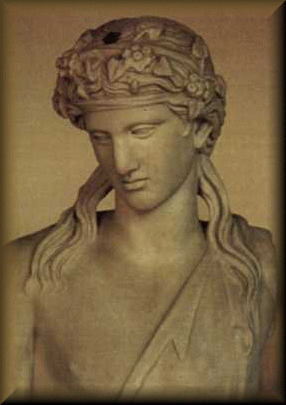
In Greek mythology Dionysus is the God of Nature, and the God of the Vine and Wine (later personified by the Roman god Bacchus). As Dionysus, he was also the God of Ecstasy and his cult was one of the mystery religions. He produced the first wine from the vine, and spread the art of tending grapes, but he also had a dual side to his nature, on the one hand he could bring about joy and divine ecstasy and on the other hand brutal unthinking rage, both reflecting the nature of wine.
Dionysus is the son of Zeus and Semele and the only god to have a mortal parent. Legend has it that Zeus came to Semele in the night invisible, felt only as a divine presence. Semele was pleased to be a lover of a god even though she did not know which god it was. But word of his infidelity soon spread and Hera his wife quickly assumed who was responsible. She went to Semele in disguise and convinced her that she should see her lover as he really was. When Zeus next came to see her, Semele made him promise to grant her one wish, he was made to swear on the River Styx that he would grant her request.
Zeus by this time was madly in love and agreed, even though he knew what would happen. She then asked him to show her his true form. Zeus was unhappy, but having sworn he had no choice. When he appeared in his true form Semele was instantly struck dead by the sight of all his glory. Zeus then took the unborn Dionysus from Semele' womb and sewed the infant into his thigh till he was ready to be born. After due time Dionysus emerged from his thigh perfectly formed and became known as "the twice-born god" associated with death and rebirth.
In another legend Hera still jealous about Dionysus arranged for the Titans to kill him, and in response they ripped him into to pieces. However the goddess Rhea (also known as Cybele) brought him back to life. After this Zeus arranged for his protection and turned him over the mountain nymphs to be raised. It was they who taught him to tend the vine.
Dionysus is one of the few gods who was able to bring a dead person out of the underworld. Even though he had never seen his mother Semele, he descended into the underworld in an effort to bring her back. Hades agreed to release her only if Dionysus gave him something he held very dear, so Dionysus gave up the myrtle plant. On his way into the underworld he had met a man called Prosymnus from whom he had asked for directions, the man agreed but asked for certain sexual favors to be repaid on his return. On his way out Dionysus was unable to keep his promise to Prosymnus for had died, so instead Dionysus planted a phallus-shaped stick on his tomb in repayment.
Dionysus wandered the world accompanied by Maenads, actively encouraging his cult and worship. The Maenads were wild women often flush with wine, their shoulders draped with fawn skins and carrying rods tipped with pinecones. While the other gods erected temples for their worship, the followers of Dionysus worshipped him in the woods. There they would work themselves up into mad states of frenzy and ecstasy, and any animals they came upon would be rip apart in sacrifice, their flesh eaten raw. As Bacchus he was accompanied Bacchantes, a similar band of woman worshippers who also roamed the forests dressed in animal skins.
Dionysus became one of the most important gods in everyday life, and associated with several key concepts. One was rebirth after death. Here his dismemberment by the Titans and return to life is symbolically echoed in tending vines. Each year the vines are pruned back sharply and left to become dormant through the winter, ready to bear fruit in the following spring. Another concept is that under the influence of wine we can connect with nature. In the mystery traditions intoxication comes not from the plant but from the spirit of the plant, the divine essence, under which we become free and liberated from the constraints of formal society. At these times a man might be greater then himself and do works he otherwise could not.
In ancient times the festival of Dionysus was held in the spring when the leaves begin to reappear on the vine. Because he was the god of wine, his festivals were lively affairs that offered the chance to put aside the daily routines of life and get caught up in wild celebrations. Though in many cases only those who had been initiated into the cult could participate in the festivities. Over time it became one of the most important events of the year, and its focus became the theater for drama. Most of the great Greek plays of the times were specially written to be performed at the feast of Dionysus. All those who took part, the writers, actors and spectators were regarded as scared servants of Dionysus during the festival.
As Bacchus they celebrated the Bacchanalia, or festival of Bacchus every third year. But the attics of the worshippers became so immoral that the Roman Senate suppressed it in 186 BC, and all the Bacchic sanctuaries were destroyed. The religion however continued and was popular in the first century, by the second century it is known there was a group of 500 worshippers at Frascati in Italy, and presumably other such groups existed.




Copyright © 2001-2004, Chinababee -- All Rights
Reserved

